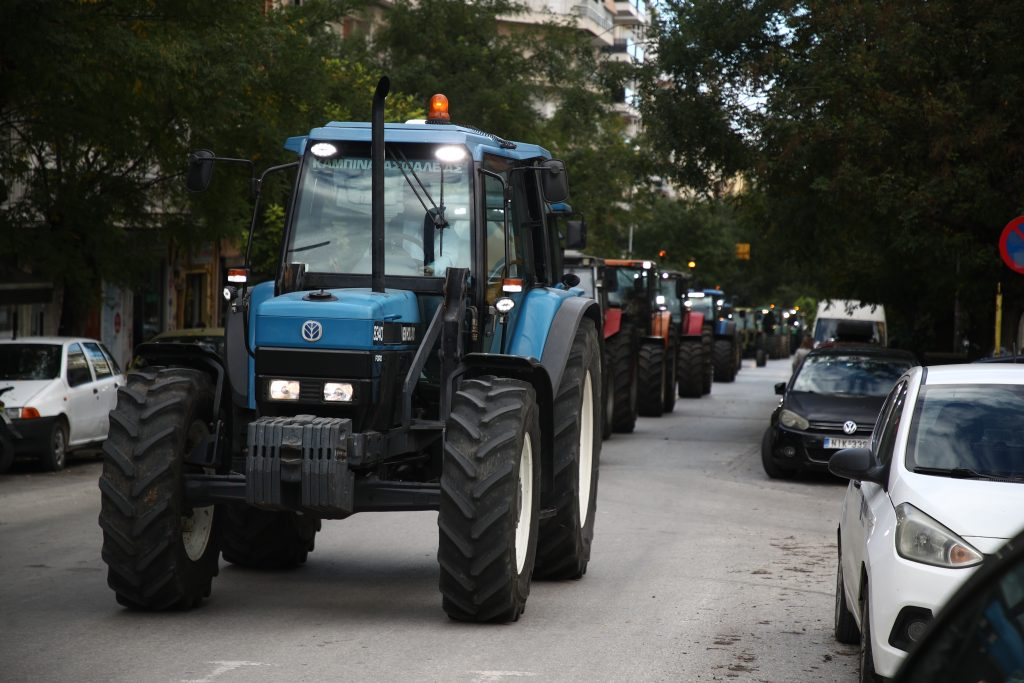Farmers and livestock breeders from across Greece rallied in Athens and Thessaloniki on Tuesday, protesting rising costs, delayed payments, and a devastating sheep and goat pox outbreak that has led to the culling of more than 400,000 animals
Thousands of farmers, livestock breeders, and beekeepers from across Greece filled the streets of Athens and Thessaloniki on Tuesday, demanding urgent support for a sector they say is at breaking point.
Agriculture accounts for 3.3 percent of Greece’s GDP — the third-highest share in the European Union — but producers say they are struggling under the weight of rising energy and feed costs, plummeting product prices, and chronic delays in state and EU payments.
In Athens, demonstrators gathered outside the Ministry of Rural Development and Food, chanting for the survival of Greece’s primary sector. Earlier, they had marched from Karaiskaki Square under a heavy police presence before delivering petitions to Minister of Rural Development and Food, Kostas Tsiaras and they are planning to continue their demonstration outside the agricultural payments agency, OPEKEPE, which has been the epicenter of the agricultural subsidies scandal that has envelopped the government over the last few months.
“This is a national gathering — farmers from Crete to the Evros have united,” said Pavlos Satolias, president of the National Union of Agricultural Cooperatives of Greece . “The country’s farming community is standing up for its rights,” said Pavlos Satolias. “It is unacceptable that because of a few opportunists who mishandled our funds, 600,000 families remain unpaid and effectively held hostage. This has dealt a heavy blow to the economic fabric of rural Greece.
Satolias also pointed to the ongoing outbreak of sheep and goat pox, which has forced the culling of more than 400,000 animals nationwide. “The government has failed to contain the disease and to ensure timely payments,” he said, warning that Tuesday’s demonstrations marked “only the beginning” of a wider protest wave.
“We want to be in our fields and stables, not in the streets,” he added. “But we can’t survive like this.”
The protest drew political figures from across the spectrum. PASOK leader Nikos Androulakis joined the demonstrators, accusing the government of inaction and warning that rural Greece was being “left behind.”
“The Greek periphery is dying,” Androulakis said. “Production costs are unbearable, and promised subsidies remain unpaid. The primary sector is both an engine of growth and a foundation of social cohesion — yet no meaningful support has been delivered.”
Farmers in Thessaloniki Join the Nationwide Protests
In Thessaloniki, convoys of tractors and pickup trucks from surrounding areas converged on the Ministry of Macedonia and Thrace, blocking nearby streets for much of the day. In Halkidiki, farmers staged a symbolic roadblock, citing delayed compensation and falling milk prices.
“The situation has reached its limit,” said Markos Markou, vice president of the Agricultural Cooperative of Epanomi. “Subsidies are delayed, promises are broken, and small producers are being pushed out. We want payments tied to real production — not to loopholes that benefit those who don’t even farm.”
Across Greece, farmers describe a growing sense of abandonment and anxiety. “The primary sector is dying. The countryside is emptying,” said Dimitris Kapounis, head of the Naxos Agricultural Union. “If this continues, Greece will soon face a food security problem.”
Farmers’ unions plan to hold a nationwide assembly in the central city of Larissa on November 23 to decide whether to escalate their mobilizations.
Source - https://www.tovima.com













